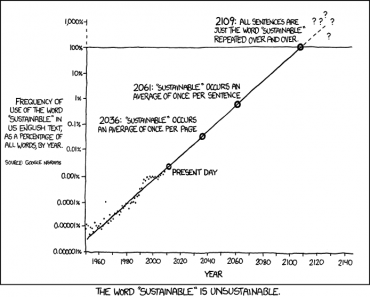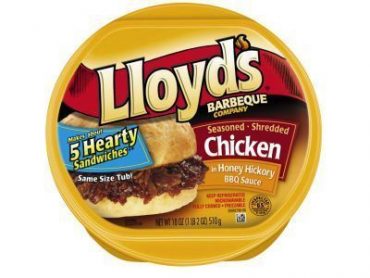
John Bleasby
The making of an overworked cliché: “Sustainability”
Canadian ContractorEvery marketer is in on the act, from Mike Holmes to Lloyds Shredded Chicken
Tragically, the word “sustainable” has been hijacked and misused almost beyond recognition over the last 10 years. Tragically, because its true purpose is to describe a real and necessary objective in the design and construction of houses over the next decade and beyond. However, now the word “sustainable” finds itself inserted into the marketing mantras of the most bizarre array of consumer products.

At the current rate, the word “sustainable” will be the only word spoken in the English language next century!
“Sustainability” has been around for over 40 years
The original term “sustainability” came from the Brundtland Commission commissioned by the UN way back in 1987; “Development that meets the needs of the present without compromising the ability of future generations to meet their own needs.” Proponents who were there from the beginning would add that “sustainability” is the “conscious choice to use simpler, repairable, resilient systems,” that sprung from a disillusionment and disenchantment with the new high tech gizmos seeping into green design.
“Sustainable” hypocrisy is abundant and evident
There is also a strong hint of hypocrisy from those who ardently promote all things “sustainable”. For example, the guru of Canadian environmental concerns and “sustainability” generally, celebrity TV host, media darling, and lecturer Dr. David Suzuki, is paid between $30,000 and $50,000 each time he stands at a podium and hectors citizens and politicians alike to pay more heed to the environment. It’s ironic because here is a man with a net worth estimated at $25 million who owns four homes in different locations, including one property allegedly co-owned with a fossil fuel company. His Vancouver home alone has an estimated value exceeding $8 million. It almost goes without saying that Dr. Suzuki neither walks nor pedals a bike between his various homes and lecture engagements.

Holmes Approved Homes uses the term “sustainable” in its marketing, but won’t tell us what they think it means. (photo: Facebook)
We ask the Holmes organization what “sustainable” means. They don’t answer
Looking closer to the home building world, what has “sustainability” come to mean? When a multi-millionaire TV handyman like Mike Holmes uses the word on his Holmes Approved Homes website — “Whether you want to make sure your home is healthy, sustainable and energy-efficient or just built right….” —it’s worth finding out. Canadian Contractor attempted to contact Homes Approved Homes. They don’t post a phone number, so an email was sent. We asked if they could direct us to one or more “sustainable” builders on their list of approved builders. We also asked if we could speak with Holmes Approved Homes personnel directly to learn more about their understanding of the word. They did not respond to our requests.
Despite the lip service, “sustainable” still has important meaning
Yet, ”sustainable development” and “sustainable building methods” have a place of true value in the residential construction lexicon. Canadian Contractor spoke to Shane McInnis, an instructor and project supervisor with the Endeavor Centre in Peterborough, Ontario in search of the term’s true meaning and relevance today. The Endeavor Centre is a unique, privately-funded learning facility that, amongst other things, takes on a summer-long renovation or building project using the latest concepts in “sustainable” building. Students literally from all over the world pay tuition for the privilege of working and learning on site. Asked what “sustainable” means at the Endeavor Centre, McInnis replied, “The way I define it, and the way that we generally define it here, is to actually set goals for the project. Those goals should be measurable and they need to take into account five factors: the combined carbon {from manufacture to transportation], indoor air quality for the occupants, responsible waste management, how much you are actually diverting away from the landfill, and energy efficiency. It’s a matter of having responsible objectives set at the start based on the specifics of a project.”
Sounds flexible, sounds reasonable, sounds well considered. Within each of those five overall objectives are nuanced responses to the particular project. It’s pretty hard to find issue with any of them.

Where will it all end? “Sustainability” marketing has reached almost absurd levels, like seasoned, shredded chicken
Seasoned shredded chicken? Seriously?
Nevertheless, the term “sustainable” is losing its punch. Treehugger.com writer Lloyd Alter let fly with his comments on Lloyd’s (no relation) Barbeque Chicken company when they introduced new packaging for their seasoned and shredded chicken parts. “Lloyd’s claims that by making these changes to their packaging they are saving more than 970 tons of wood or 6,000 trees annually. The owner has a page on ‘sustainability’ and says ‘I’m out to fill stomachs, not landfills.’ And saving paper is good and has real benefits, a step in the right direction. But does removing an unnecessary paper wrapper from a plastic tub of chicken parts of unknown origin make it sustainable?”
A new word is needed— “Resiliency” perhaps?
While critics throw mud at the capitalistic motives of companies and celebrities jumping on the “sustainability” bandwagon, those truly concerned about the way homes are built now and in the future are searching for a replacement term. Some feel the word “Resilience” has more meaning and relevance today.
In the meantime, contractors and consumers alike will surely feel bombarded by the world “sustainable” going forward. It’s not all bad. Despite the “greenwashing” evident in certain marketing strategies and promotional material, governments are getting on-board and helping stay within understandable guidelines. The State of Queensland in Australia, for example, summarizes its outlook in three ways: social sustainability, environmental sustainability, and economic sustainability, and goes on to explain each of these in detail.
Rather like the vagueness demonstrated by Holmes Approved Homes, Canadian builders reaching out to prospective clients interested in renovating or building in a more “resilient” or “sustainable” manner might be encouraged to be more precise. By openly defining their approach and how it impacts their company’s methods, and how it meets the philosophical as well as physical requirements of their clients, will keep themselves clear of any suggestions of “sustainability” doublespeak.
Got feedback? Make your opinion count by using the comment section below,
or by sending an email to:
JBleasby@canadiancontractor.ca
Follow John on Instagram and on Twitter for notifications about his latest posts

![]()

Leave a Reply